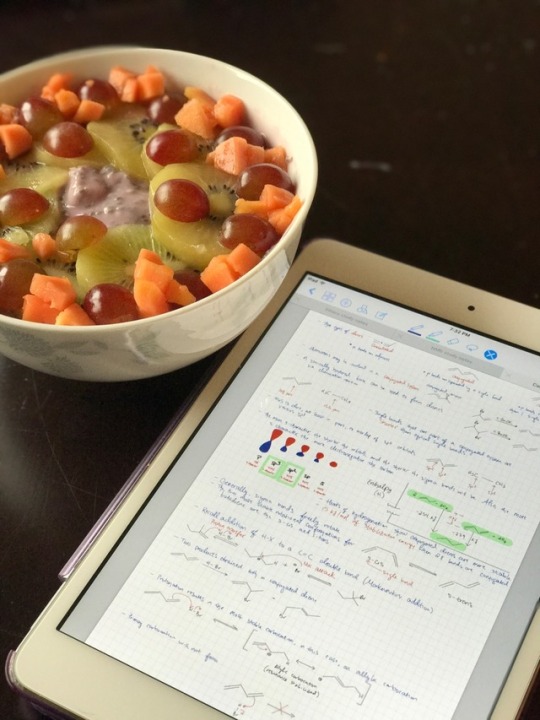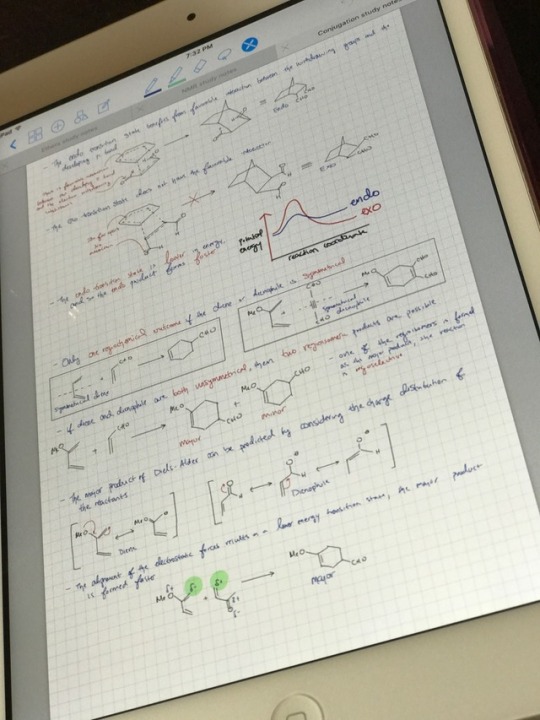24 year old microbiology senior at a cal state university. This will be dedicated to anything microbiology, biology, chemistry and studyblr related stuff.
Don't wanna be here? Send us removal request.
Photo

studying my life away - feb 28 2017
0 notes
Photo




notes on chemical bonds & van der waals forces
thank you so much for 1.1k+ everyone!!
5K notes
·
View notes
Photo

aug.10 | not a good idea for me to catch up with microbio lecture on bed but I’m tired af and may go to sleep soon TvT
289 notes
·
View notes
Photo

refresher before school starts #notmyphoto
1 note
·
View note
Text
Move In Day Checklist
Move in day was exciting and scary. I moved in with 3 complete different strangers who had moved in the week before. Our campus had university apartments which came with its own kitchen and living room. I remeber bringing a suitcase - I didnt want to overpack and looking back, this turned out to be a bad thing since every weekend I had to go home to get things I needed. So, I am creating a check list of things you need to move in to a dorm or a university apartment.
NOTE:.If you get a chance to talk to your future roomates before moving in, that could save you all from buying duplicate things (We had 3 eletric kettles, 2 britas and multiple sponges.
here we go
Bedroom:
- bedsheets (2x)
comforter
pillows
pillowcases
blanket
optional: paper lanterns, posters, wall decor - if you decide to do this I recommend getting wall safe adhesive double sided tape - dont hang them with nails - you will get charged for it later

hangers
hamper (for dirty laundry)
plastic bins (if your dorm does not come with drawers - get bins to put any extra clothing or shoes)
lysol wipes (for surface cleaning)
febreeze - for air refreshner
for the desk:

stapler (this was the most needed item among my roomates
tape
scissors
glue
pencil case or cup
printer
cork board
white board (for math or chem or bio)
calculator
you can also use the space to put any make up or perfume
a lamp
power extentsion cables (popular item)
a vacuum
also if you bring snacks - place them in a zip loc bag to prevent crub,s from falling out andcattracting bugs)
a coaster (for tea or coffee)
a part two will be made for the bathroom and kitchen
8 notes
·
View notes
Photo

From summer term 2017
I was following along a youtube tutorial for VDJ recombination (this is for immunobiology) at the university library. This Is my productive chaos. It gets hot in the valley so my hat and water are there. I bought a water bottle so my wallet is there too. The pens are from paper mate ink joy, pilot acroball and bottle 2 pens, and uniball signo micro 207
I found that if I draw out the diagrams, It helps me visualize processes better and thus, helps me understand what is happening.
0 notes
Text
Upcoming courses - 8.7.17
I am taking microbial genetics, organic chemistry and cells/tissue cultures. All upcoming posts and notes will be regarding these topics. If I find anything useful or helpful, I will be posting them to help save a life.
0 notes
Text
Some Things I needed for University (part 1)
I am approaching my final year in university!! Finally. So I thought I’d share somethings in case it helps anyone:
- the weather app is your best friend: this determines what clothes to wear. I live in the valley so we get summer until November, two weeks of fall, and then winter (cold and very very windy) until late April and the 2 weeks of spring and then its summer again. My wardrobe staples are summer dresses and motorcycle jackets (this keeps out the wind).
- water bottles: Invest in one. I used to spend $10 a week on plastic water bottles until I decided I had enough so I just make a one time purchase of $12.99 on a BPA free water bottle and you are good to go.
- This contigo stainless step west loop 16-oz travel mug - in the winter this keeps coffee and tea super warm for 6+ hours. It is about $11-16 dollars online. I highly recommend it.

- a planner - It could be a bullet journal, planner or a calendar app on your iPhone - this will help you plan your study schedule and prevent exams from popping up out of nowhere. It also helps prevent procastination
- rent textbooks - if you are a freshman or sophomore - most likely you are taking GE courses. That being said you are better off renting the required textbooks on amazon or barnes n noble or chegg, since most likely you won't be needing it unless its for your major. My classmates and myself have had experiences where we purchase the book and right after the semester ends, a new edition comes out and your textbook drops significantly in value. Also, renting helps you save money.
- composition books - This varies depending on the major. I am a science major. In community college - my lab professors required me to have a special lab notebook purchased from the bookstore. However, in university, all my lab teachers required a composition book. You can purchase them in target for $1 right now so if you are a science major, or if you like composition books, I would get them now
- a pencil case - any one is fine, just find one thats right for you. I have a typo pencil case which carries a decent amount of pens, lead pencils, highlighters, etc.
I hope this helps anyone who is going back to school or anyone who is about to attend university right now. Good luck.
4 notes
·
View notes
Photo

My last midterm of the quarter is tomorrow! Studying ochem all day today 💖
[used: Crayola Supertips in Magenta, Sharpie Pen Fine Point in Black, Tombow Fudenosuke Brush Pen Soft Tip in Black]
424 notes
·
View notes
Photo
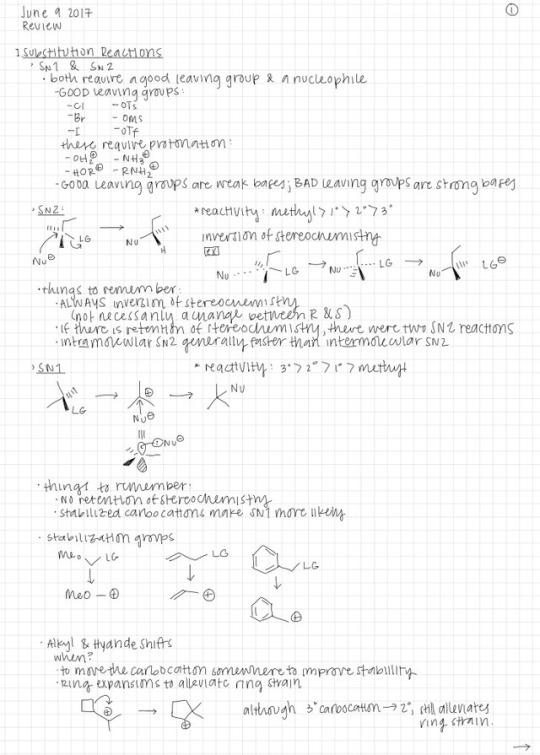



June 10 2017
Yesterday I scribed for my ochem TA, so here are those notes! We’re finishing off the quarter with synthesis reactions (honestly I am so scared they are so hard) and we have to memorize like, 30 different reactions. I. am. scared.
I just finished my 12 page term paper for my writing class and last night I finished studying for my life science class, all that’s left is to study chem lab and trrrryyyy to understand what the heck is synthesis in ochem!!!!
Ellee
339 notes
·
View notes
Text
Exam
I don’t have time to study enough… this is yet another time i need to rely on my brain excelling far beyond what I thought it was capable of. We will see….
5 notes
·
View notes
Photo
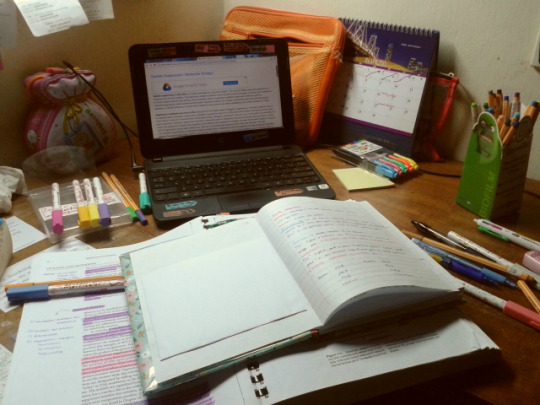
5.00 a.m. Early morning study. I am inspired by my fellow studyblrs and decided to gather up my strength and do it! Microbial genetics for next week test. We can do it people! ;)
4 notes
·
View notes
Photo

❄️💖Last year me revising A level organic Chemistry in the Alps 💖❄️
290 notes
·
View notes
Text
Some Tips On Organic Chemistry
When you’re looking at two compounds and wondering how they may react, pay attention to the carbons - if they are bonded to a halogen or something more electronegative than them, then they have a partial positive charge and they’re going to want anything that will give them more electrons (a.k.a. a nucleophillic attack). If they’re bonded to hydrogen, they have a partial negative charge and they become your nucleophile, which will want to give those electrons to something that’s lacking them. Once you get these basics down, mechanisms become much easier to memorize because you can see the logic in them and sometimes predict them.
Get the basic mechanisms ingrained in your brain. Think of SN1, SN2, E1 and E2 as your new multiplication table. Make flashcards about them and take them to class. Or put them at the back or front of your notebook. Just have them handy at all times.
Draw the final steps in 3D. ALWAYS. You can draw the mechanisms and the first steps in 2D because it will make it easier to understand, but never forget that you’re working with a 3D structure that can flipped (and attacked by nucleophiles) every which way. Also, if you don’t know the basic perspectives used in orgo (Fischer, Newmans, sawhorse, wedge-dash) please take half an hour to learn them. Mainly wedge-dash and Fischer, but Newman is very useful when deciding which position you should put your atoms in if you’re dealing with sin and anti.
Colors. If you’re one of those people who ONLY writes in black pen, awesome, keep using it for WRITING. For reactions though, you’re going to want options. you’ll need to differentiate between:
The molecules (same color for atoms and bonds, unless you want to finish your notes on your deathbed).
Your three types of arrows: electron flow, actual steps in the reaction (think intermediates) and steps you may take to make it clearer for you but that happen at the same time.
Formal charges
The electrons that stay with its original atom and the ones that are given/shared, if you’re like me and you like your mechanisms to be spelled out.
This is not an excuse to go nuts with the coloring, 3 colors are enough. Personally, I use purple for molecules, electrons and reaction arrows, black for electron flow arrows and charges and light blue for clarification step arrows. Also optional but to denote a homolytic fission I usually write a blue line perpendicular to the bond. Similarly, if two atoms share one electron each, instead of just one them donating both electrons, I link said electrons with blue.
Remember to be consistent, otherwise you’ll end up like me, looking at your notes from the beginning of the semester and wondering if that dash is a bond or a -1 formal charge (to avoid this, preferably circle formal charges. Lol I never do this but I should).
Flashcards are so helpful! Write the reactants on one side and the mecanism and products on the other. Test yourself until you are one with the electrons.
If it’s a concerted mechanism, number the arrows. You’ll thank yourself a month from now.
Khanacademy. Khanacademy will save your butt when it comes to mechanisms. Chemwiki is likely to have anything that Khanacademy doesn’t. If it isn’t in either of those, Google images just became your new best friend. Books also tend to explain those nicely but I personally find them to be poorly structured and they usually include much more info than what you’ll actually be requiered to know. If you have the time to read two pages on a reaction though, by all means go for it.
Study in advance. Good luck studying for your final two days before if you don’t understand the mechanisms and you don’t have your material organized. Seriously, don’t do it. A week before the exam you could make those flashcards mentioned above. They’re a great way to review but it will be impossible if you are learning these things from scratch.
Get your hands on past tests. This goes for any subject but especially for orgo. Try to get a past test or at least ask an upper-classman who’s taken orgo with that professor. Does his/her tests focus on mechanisms? Retrosynthesis? Or does he/she give you the reactants and ask what the product is or what environment they should be in to obtain x? Ideally, you should be able to answer any of these if you know the material. However, if they focus on retrosynthesis, it may be a little tricky, so make sure to cater your study techniques to that.
You should also check out @colllegeruled’s Surviving Organic Chemistry, it’s super helpful and it has lots of resources (seriously, you introduced me to Khanacademy, I OWE YOU MY LIFE).
So, this is what I can offer so far. I hope it shines at least a faint light into the dark path that is organic chemistry.
Other masterposts
How To Stop Procrastinating
Memorization Tips
Skincare 101
Taking Notes in College
6K notes
·
View notes
Photo
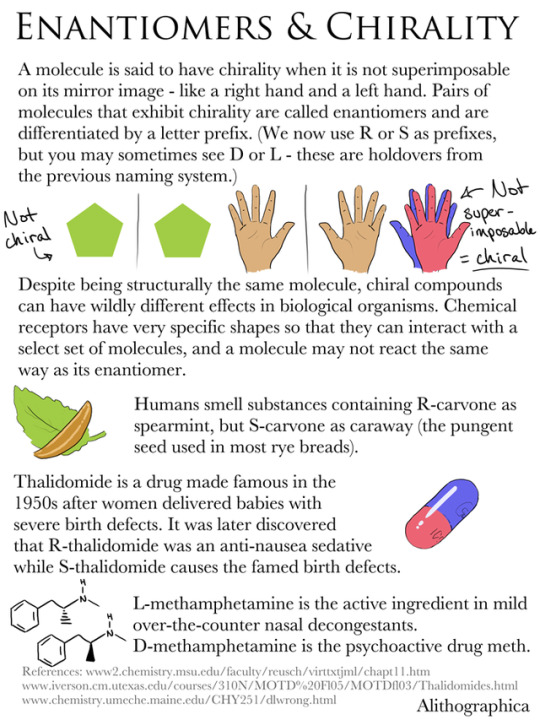
Science Fact Friday: Welcome to the wild world of chirality.
780 notes
·
View notes

